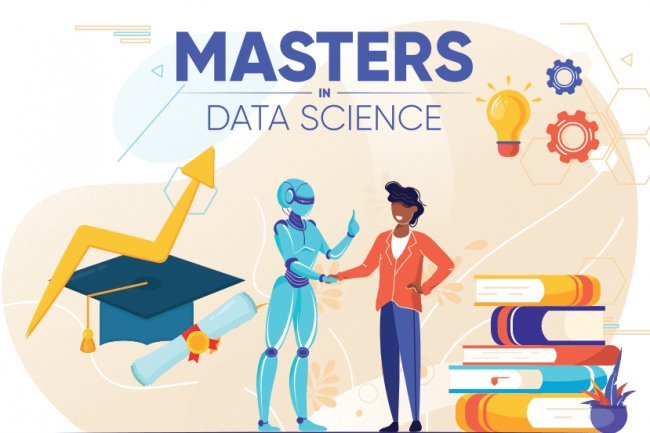Machine Learning Course | Machine Learning Training Institute in Lucknow
15+ Years Of Diligence & Excellence In Software Development Training Industry - Lucknow's Top Machine Learning Training Institute

What is Machine Learning?
Machine learning (ML) is the study of computer algorithms that can improve automatically through experience and by the use of data. It is seen as a part of artificial intelligence. Machine learning algorithms build a model based on sample data, known as training data, in order to make predictions or decisions without being explicitly programmed to do so. Machine learning algorithms are used in a wide variety of applications, such as in medicine, email filtering, speech recognition, and computer vision, where it is difficult or unfeasible to develop conventional algorithms to perform the needed tasks.
A subset of machine learning is closely related to computational statistics, which focuses on making predictions using computers; but not all machine learning is statistical learning. The study of mathematical optimization delivers methods, theory and application domains to the field of machine learning. Data mining is a related field of study, focusing on exploratory data analysis through unsupervised learning. Some implementations of machine learning use data and neutral networks in a way that mimics the working of a biological brain. In its application across business problems, machine learning is also referred to as predictive analytics.
What are some popular machine learning methods?
Two of the most widely adopted machine learning methods are supervised learning and unsupervised learning – but there are also other methods of machine learning. Here's an overview of the most popular types.
Supervised learning algorithms are trained using labeled examples, such as an input where the desired output is known. For example, a piece of equipment could have data points labeled either “F” (failed) or “R” (runs). The learning algorithm receives a set of inputs along with the corresponding correct outputs, and the algorithm learns by comparing its actual output with correct outputs to find errors. It then modifies the model accordingly. Through methods like classification, regression, prediction and gradient boosting, supervised learning uses patterns to predict the values of the label on additional unlabeled data. Supervised learning is commonly used in applications where historical data predicts likely future events. For example, it can anticipate when credit card transactions are likely to be fraudulent or which insurance customer is likely to file a claim.
Unsupervised learning is used against data that has no historical labels. The system is not told the "right answer." The algorithm must figure out what is being shown. The goal is to explore the data and find some structure within. Unsupervised learning works well on transactional data. For example, it can identify segments of customers with similar attributes who can then be treated similarly in marketing campaigns. Or it can find the main attributes that separate customer segments from each other. Popular techniques include self-organizing maps, nearest-neighbor mapping, k-means clustering and singular value decomposition. These algorithms are also used to segment text topics, recommend items and identify data outliers.
Semi supervised learning is used for the same applications as supervised learning. But it uses both labeled and unlabeled data for training – typically a small amount of labeled data with a large amount of unlabeled data (because unlabeled data is less expensive and takes less effort to acquire). This type of learning can be used with methods such as classification, regression and prediction. Semi supervised learning is useful when the cost associated with labeling is too high to allow for a fully labeled training process. Early examples of this include identifying a person's face on a web cam.
Reinforcement learning is often used for robotics, gaming and navigation. With reinforcement learning, the algorithm discovers through trial and error which actions yield the greatest rewards. This type of learning has three primary components: the agent (the learner or decision maker), the environment (everything the agent interacts with) and actions (what the agent can do). The objective is for the agent to choose actions that maximize the expected reward over a given amount of time. The agent will reach the goal much faster by following a good policy. So the goal in reinforcement learning is to learn the best policy.
Who's using it?
Most industries working with large amounts of data have recognized the value of machine learning technology. By gleaning insights from this data – often in real time – organizations are able to work more efficiently or gain an advantage over competitors.
Financial Services
Banks and other businesses in the financial industry use machine learning technology for two key purposes: to identify important insights in data, and prevent fraud. The insights can identify investment opportunities, or help investors know when to trade. Data mining can also identify clients with high-risk profiles, or use cybersurveillance to pinpoint warning signs of fraud.
Government
Government agencies such as public safety and utilities have a particular need for machine learning since they have multiple sources of data that can be mined for insights. Analyzing sensor data, for example, identifies ways to increase efficiency and save money. Machine learning can also help detect fraud and minimize identity theft.
Health Care
Machine learning is a fast-growing trend in the health care industry, thanks to the advent of wearable devices and sensors that can use data to assess a patient's health in real time. The technology can also help medical experts analyze data to identify trends or red flags that may lead to improved diagnoses and treatment.
Retail
Websites recommending items you might like based on previous purchases are using machine learning to analyze your buying history. Retailers rely on machine learning to capture data, analyze it and use it to personalize a shopping experience, implement a marketing campaign, prize optimization, merchandise supply planning, and for customer insights.
Oil and Gas
Finding new energy sources. Analyzing minerals in the ground. Predicting refinery sensor failure. Streamlining oil distribution to make it more efficient and cost-effective. The number of machine learning use cases for this industry is vast – and still expanding.
Transportation
Analyzing data to identify patterns and trends is key to the transportation industry, which relies on making routes more efficient and predicting potential problems to increase profitability. The data analysis and modeling aspects of machine learning are important tools to delivery companies, public transportation and other transportation organizations.
Machine Learning Course Eligibility and Validity Period
Machine Learning is growing constantly along with its applications. Machine Learning courses should be opted by individuals who have a keen sense of creating or building technology and have the basic idea about statistics, calculus, probability, programming knowledge and data modeling to apply for the course.
- Students who have a good understanding of coding and programming knowledge must pursue Machine Learning courses.
- Students who are good in math must definitely try for Machine Learning courses since they will find it easy to grasp.
- Individuals with good communication skills are very important in a Machine Learning career since most of the time the Machine Learning. engineers will have to decode the findings and explain them to someone who has very little idea about the technical terms.
Machine Learning Course Duration
Having gained an insight into the lucrative prospects Machine Learning as a discipline brings, we will now determine how long it takes to master Machine Learning.
Machine learning courses vary in a period from 6 months to 18 months. However, the curriculum varies with the type of degree or certification you opt for.
You stand to gain sufficient knowledge on machine learning through 6-month courses which could give you access to entry-level positions at top firms. You gain clarity with respect to the fundamentals of Machine Learning, Python, SQL and are introduced to other concepts like NLP, Deep Learning, Data Analysis, etc.
However, more is always less when you are pursuing a dynamic field such as Machine Learning that has positively impacted Education, Finance, Computer Science, Supply Chain and a diverse range of other industries. And to advance further in your career and pursue higher profiles in the field, you will require substantial expertise and hands-on experience.
Careers in Machine Learning
The advent of digitalization has been revolutionary in almost every field. This radical change has brought a new wave of software engineers who are inclined to pursue ML and AI to strive ahead in their careers. Luckily, there is a rewarding career path for software professionals with expertise in machine learning:
Here are the popular career options you can consider after completing a Machine Learning course:
1. Big Data Engineer
Average Base Salary: ₹808K /year
A Big Data Engineer is responsible for maintaining the Big Data of an organization. In this epoch where every work is dependent on data, data gets stored on the cloud. It has to be administered by someone so it can be retrieved as needed. This work is done by a Big Data Engineer and Machine Learning plays a significant role as the algorithms used in retrieving data are learned through ML.
2. Business Intelligence Developer
Average Base Salary: ₹514K /year
Along with business acumen, you can learn Machine Learning to enhance your excellence in handling a business. This confluence is imperative to managing and regulating data in a manner that the profits of an organization increase.
3. AI Data Analyst
Average Base Salary: ₹1320K /year
Data Mining, Data Interpretation, and Data Cleaning are a few skills required to be an AI Data Analyst. Other than having good knowledge of Mathematics and Computers, ML is another prerequisite to be able to interpret data correctly.
4. Product Manager
Average Base Salary: ₹1407K /year
There is a requirement of product managers in every field which makes this profile highly sought-after. It can be a product-oriented industry or a service-oriented one. As a product manager, you will need to collect and interpret data. To interpret data, expertise in Machine Learning is required to enhance the functionality of an organization.
5. Research Scientist
Average Base Salary: ₹702K /year
If you are inquisitive and tend towards research, pursuing Machine Learning will empower and boost your skillset. A background in Machine Learning can earn you an influential position in the Research and Development Department of an organization.
6. Machine Learning Engineer
Average Base Salary: ₹686K /year
If you can manage big data and work with predictive models, this is the right profile for you. Machine Learning Engineers are constantly in demand in fields that require prediction-based models of imaging, speech recognition, and cybersecurity, among others.
7. Data Scientist
Average Base Salary: ₹817K /year
Expertise in Machine Learning along with competence in multiple programming languages can enhance your skills in predicting patterns in large amounts of data. It is a data scientists’ job to predict consumer buying patterns, purchasing habits, etc. to help organizations make data-driven, intelligent decisions to drive conversions and sales.
8. AI Engineer
Average Base Salary: ₹839K /year
AI Engineers are problem solvers who use Machine Learning algorithms along with the neural network to devise AI models that can predict the data correctly.
Future Scope of Machine Learning
With companies adopting Artificial Intelligence and Machine Learning at the base of their operations to increase efficiency and pace, the future promises an even greater increment in job opportunities in this field. As per Gartner, 2.3 millions jobs have already been created worldwide and by 2025, there will be a whopping 2 million new job opportunities for aspirants to pursue.
Which is the best institute for Machine Learning in Lucknow?
SIPL Training offers Machine Learning training in Lucknow that is both practical and placement-focused. There Machine Learning course ranges from beginner to advanced level, and it is meant to help you get a job in a good MNC company as soon as possible after you complete the placement training course. The Sotware Development trainers are certified experts and working professionals with real-world expertise in various Software projects. They created machine learning course content and curriculum as per industrial requirements and help them reach their career goals. You can choose machine learning as your career, as well as work on real-time project and machine learning certification placement training from SIPL Training, Lucknow.
Interested in Machine Learning Course?
Best Machine Learning Training providers:
Address: SIPL-2nd Floor-Devpuri Complex, Faizabad Road, Near Lekhraj Metro Station, Indira Nagar Lucknow
Phone: +919565818207, +918957990909
WhatsApp: +919565818207
What's Your Reaction?











![List of Top SAP Training Institutes in India: 2025 [Updated]](https://www.sipltraining.com/blog/uploads/images/202302/image_100x75_63e4b203cb050.jpg)
![10 Best SAP Training Institutes in India with Placement 2025 [Updated]](https://www.sipltraining.com/blog/uploads/images/202301/image_100x75_63c50aa3de731.jpg)








